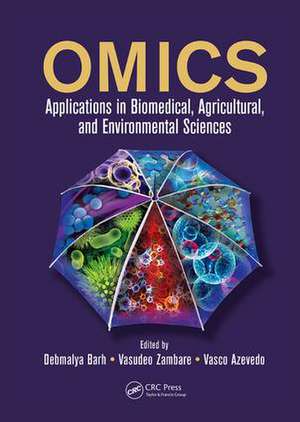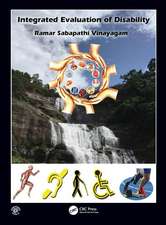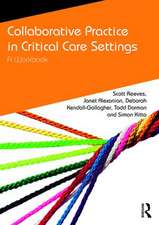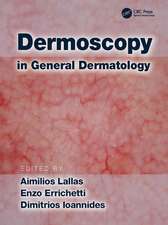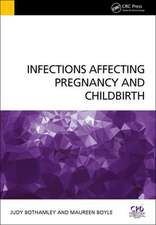OMICS: Applications in Biomedical, Agricultural, and Environmental Sciences
Editat de Debmalya Barh, Vasudeo Zambare, Vasco Azevedoen Limba Engleză Paperback – 28 apr 2017
Written by highly experienced active researchers, each chapter describes a particular area of omics and the associated technologies and applications. Topics covered include:
- Proteomics, epigenomics, and pharmacogenomics
- Toxicogenomics and the assessment of environmental pollutants
- Applications of plant metabolomics
- Nutrigenomics and its therapeutic applications
- Microalgal omics and omics approaches in biofuel production
- Next-generation sequencing and omics technology for transgenic plant analysis
- Omics approaches in crop improvement
- Engineering dark-operative chlorophyll synthesis
- Computational regulomics
- Omics techniques for the analysis of RNA splicing
- New fields, including metagenomics, glycomics, and miRNA
- Breast cancer biomarkers for early detection
- Environomics strategies for environmental sustainability
Preț: 687.96 lei
Preț vechi: 809.36 lei
-15% Nou
Puncte Express: 1032
Preț estimativ în valută:
131.64€ • 137.81$ • 108.92£
131.64€ • 137.81$ • 108.92£
Carte tipărită la comandă
Livrare economică 05-19 aprilie
Preluare comenzi: 021 569.72.76
Specificații
ISBN-13: 9781138074750
ISBN-10: 1138074756
Pagini: 718
Ilustrații: Approx. 5 to 15 equations; 67 Tables, black and white; 97 Illustrations, black and white
Dimensiuni: 178 x 254 mm
Greutate: 3.3 kg
Ediția:1
Editura: CRC Press
Colecția CRC Press
ISBN-10: 1138074756
Pagini: 718
Ilustrații: Approx. 5 to 15 equations; 67 Tables, black and white; 97 Illustrations, black and white
Dimensiuni: 178 x 254 mm
Greutate: 3.3 kg
Ediția:1
Editura: CRC Press
Colecția CRC Press
Public țintă
Professional Practice & DevelopmentCuprins
The World of Omics and Applications in Biomedical Sciences: Proteomics: Techniques, Applications, and Challenges. Epigenome: Genomic Response to Environmental Eccentricities. Epigenomics: Basics and Applications. Pharmacogenomics for Individualized Therapy. Pharmacogenomic Knowledge to Support Personalized Medicine: The Current State. Toxicogenomics: Techniques, Applications, and Challenges. The World of Noncoding RNAs. Spliceomics: The OMICS of RNA Splicing. Computational Regulomics: Information Theoretic Approaches toward Regulatory Network Inference. Glycomics: Techniques, Applications, and Challenges. Breast Cancer Biomarkers. Use of Protein Biomarkers for the Early Detection of Breast Cancer. The World of Omics and Applications in Plant and Agricultural Sciences: Genomics, Proteomics and Metabolomics: Tools for Crop Improvement under Changing Climatic Scenarios. Application of Next-Generation Sequencing for Abiotic Stress Tolerance. Next-Generation Sequencing and Assembly of Bacterial Genomes. Towards Engineering Dark-Operative Chlorophyll Synthesis Pathways in Transgenic Plastids. Utilization of Omics Technology to Analyze Transgenic Plants. Microalgal Omics and Their Applications. Plant Metabolomics: Techniques, Applications, Trends, and Challenges. Nutraceuticals: Applications in Biomedicine. Genomic Resources of Agriculturally Important Animals, Insects, and Pests. The World of Omics and Applications in Environmental Sciences: Applications of Molecular Spectroscopy in Environmental and Agricultural Omics. Metagenomics: Techniques, Applications, and Challenges. Toxicogenomics in the Assessment of Environmental Pollutants. Omics Approaches in Biofuel Production for a Green Environment. Environomics: Omics for the Environment. Index.
Notă biografică
Debmalya Barh is the founder and president of the Institute of Integrative Omics and Applied Biotechnology (IIOAB), India, a global platform for multidisciplinary research and advocacy. He is a consultant biotechnologist and has more than 12 years of rich experience in interdisciplinary omics fields. His research areas include integrative omics–based translational researches, target and targeted drug discovery, biomarkers, pharmacogenomics, neutrigenomics, cancer, neuroscience, cardiovascular diseases, infectious and metabolic diseases, and plant, animal, and environmental biotechnology. As an active scientist in the field, he works with nearly 200 researchers from more than 80 institutes across 25 countries. He has edited a number of research reference books in the areas of omics, biomarkers, and other advanced domains in biology. He also serves as an editorial and review board member for several professional international research journals of global repute.
Vasudeo Zambare is a biochemist. He previously worked at Agharkar Research Institute, India, and the Center for Bioprocessing Research and Development at the South Dakota School of Mines and Technology, USA. His current research concentrates on the use of omics technologies in agriculture, functional food, and environmental sciences. He has published more than 150 peer-reviewed articles and is editor-in-chief, technical editor, associate editor, editorial board member, or advisory member of more than 80 international research journals. He is a fellow member of several international societies, including the Institute of Integrative Omics and Applied Biotechnology (IIOAB).
Vasco Azevedo is a full professor in molecular biology and genetics at the Federal University of Minas Gerais, Brazil. He is a pioneer scientist in lactic acid bacteria and Corynebacterium pseudotuberculosis and a well-known scientist in bacterial genomics, transcriptomics, proteomics, and metabolomics. His research also involves omics approaches in livestock and agricultural biotechnology in the development of new omics-based vaccines and diagnostics against infectious diseases. He has published 160 research articles and 15 book chapters. He is an associate editor of several journals, including Genetics and Molecular Research, Microbial Cell Factories, and The IIOAB Journal, and an editorial board member of a number of international journals.
Vasudeo Zambare is a biochemist. He previously worked at Agharkar Research Institute, India, and the Center for Bioprocessing Research and Development at the South Dakota School of Mines and Technology, USA. His current research concentrates on the use of omics technologies in agriculture, functional food, and environmental sciences. He has published more than 150 peer-reviewed articles and is editor-in-chief, technical editor, associate editor, editorial board member, or advisory member of more than 80 international research journals. He is a fellow member of several international societies, including the Institute of Integrative Omics and Applied Biotechnology (IIOAB).
Vasco Azevedo is a full professor in molecular biology and genetics at the Federal University of Minas Gerais, Brazil. He is a pioneer scientist in lactic acid bacteria and Corynebacterium pseudotuberculosis and a well-known scientist in bacterial genomics, transcriptomics, proteomics, and metabolomics. His research also involves omics approaches in livestock and agricultural biotechnology in the development of new omics-based vaccines and diagnostics against infectious diseases. He has published 160 research articles and 15 book chapters. He is an associate editor of several journals, including Genetics and Molecular Research, Microbial Cell Factories, and The IIOAB Journal, and an editorial board member of a number of international journals.
Descriere
Featuring contributions from active researchers around the world, this book explores current and emerging fields such as glycomics, miRNA, metagenomics, and environomics and their various applications. In one volume, it examines a wide range of applications across the life sciences, demonstrating the real diversity of omics. This timely book discusses toxicogenomics in the assessment of environmental pollutants, plant metabolomics, nutrigenomics and its therapeutic applications, microalgal omics, omics for biofuel development, omics approaches for crop improvement and environmental sustainability, breast cancer biomarkers, and much more.
